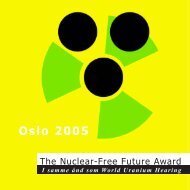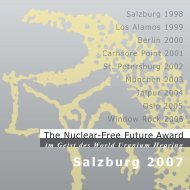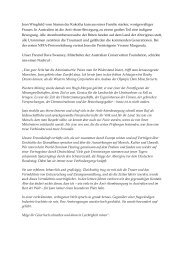New York City - The Nuclear-Free Future Award
New York City - The Nuclear-Free Future Award
New York City - The Nuclear-Free Future Award
You also want an ePaper? Increase the reach of your titles
YUMPU automatically turns print PDFs into web optimized ePapers that Google loves.
<strong>The</strong> deserts of North Africa are touted across Europe as the<br />
green solution to all energy worries. <strong>The</strong> magic word: DeserTec.<br />
What Europeans forget is that the plundering of natural resources<br />
in the Sahara and Nambib has been going on for decades<br />
– often with dire consequences. Both desert regions are the<br />
traditional homelands of indigenous peoples: to the north, in<br />
the desert of Niger, live the nomadic Tuareg; to the South, in<br />
Namibia, lies the home of the San. Both areas – among the most<br />
arid on earth – host water-intensive mining operations: AREVA<br />
mines uranium in Niger, and in Namibia, Rio Tinto. <strong>The</strong> cozy<br />
relations these corporations enjoy with government authorities<br />
allow them to take<br />
land from indigenous<br />
peoples without<br />
compensation,<br />
and to continue unchecked their appalling environmental<br />
records. Desert aquifers have already been drained of billions<br />
of liters of water – a vital resource that will take millions of<br />
years to replenish.<br />
Finally, anti-nuclear activists from across Africa have<br />
linked up to take a stand against this brand of old-school colonialism.<br />
<strong>The</strong> African Uranium Alliance (AUA) is led by, from<br />
south to north: Mike Kantey and Mariette Liefferink of<br />
South Africa, Bertchen Kohrs and Hilma Shindondola-Mote<br />
from Namibia, Matthias Boniface and Anthony Lyamunda<br />
from Tanzania, Reinford Mwagond from Malawi, Diderot<br />
Nguepjouo from Cameroon, and Almoustapha Alhacen of<br />
Niger. An elder from Malawi summed up the AUA message in<br />
three words: “Uranium is death.”<br />
<strong>The</strong> mission of the AUA is not only to protest plans to open<br />
up new uranium mines, but also to educate those employed at<br />
working mines about the imminent health risks. <strong>The</strong> Alliance<br />
found that black employees, laboring for wages far less than<br />
the white workforce, often had no idea that repeated radiation<br />
exposures placed them at a much higher risk than the general<br />
population to contract respiratory ailments, leukemia, cancers.<br />
Few miners had ever set eyes on a dosimeter, and many were<br />
not issued facial masks or shielding work clothes.<br />
Almoustapha Alhacen tells us: “Radioactivity increases<br />
poverty because it creates more victims. With each passing<br />
day we are exposed to radiation and continue to be surrounded<br />
by poisoned air, polluted water and earth – while AREVA<br />
Resistance<br />
6<br />
makes hundreds of<br />
millions from our natural<br />
resources.” AREVA<br />
claims that in over<br />
forty years of uranium<br />
min-ing, not one case<br />
of work-related illness<br />
has come to light. How<br />
do they do it? According<br />
to NGOs CRIIRAD<br />
and SHERPA, doctors<br />
at the AREVA-owned<br />
hospital in the north<br />
of Niger diagnose<br />
mineworker cancers<br />
as HIV/Aids. Stigma<br />
sweeps everything<br />
under the carpet.<br />
Niger’s government<br />
intends to give out 140<br />
mining ex-ploration<br />
titles to multi-national<br />
uranium concerns – for<br />
the Tuareg a sentence<br />
of death.<br />
*<br />
On the 27th of July,<br />
African Uranium Alliance. From top left to<br />
2010, we received an bottom right: Anthony Lyamunda (Tanzania),<br />
email from African Hilma Mote (Namibia), Mike Kantey (South<br />
Uranium Alliance activist<br />
Reinford Mwangonde of Malawi: “Could you get back to<br />
us please? Something terrible has happened. A truck loaded<br />
with yellowcake from the Kayelekera mine overturned and two<br />
people were killed. No reaction from Paladin mining or the<br />
government. We are evacuating people from the area, but have<br />
no place to put them.”<br />
<strong>The</strong> <strong>Nuclear</strong> Age as lived daily in Africa. With a portion<br />
of the <strong>Award</strong> money, tents could be purchased for those pushed<br />
from their homes.





